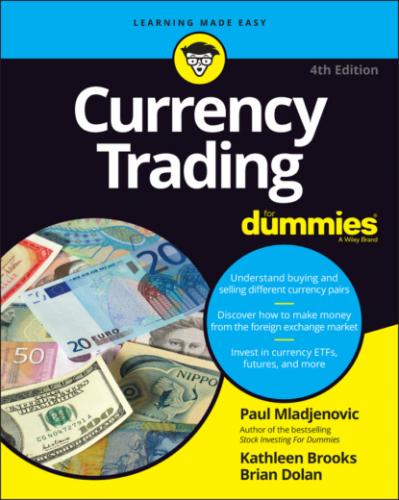Get a comprehensive overview of the forex market and how it works.
Find out what moves currencies.
Acquaint yourself with the main players in the forex market.
Understand the motivations behind trading decisions and simple strategies to get started.
Discover why the world’s biggest market is the most fascinating market.
Chapter 1
Currency Trading 101
IN THIS CHAPTER
The forex (foreign exchange) market has exploded onto the scene and is the hot new financial market. It’s been around for years, but advances in electronic trading have now made it available to individual traders on a scale unimaginable just a few years ago.
We’ve spent our professional careers in the forex market, and we can’t think of a better traders’ market. In our opinion, nothing quite compares to the speed and exhilaration of the forex market or the intellectual and psychological challenges of trading in it. We’ve always looked at our work as essentially doing the same thing every day, but no two days are ever the same in the forex market. Not many people can say that about their day jobs, and we wouldn’t trade it for the world, no pun intended.
What Is Currency Trading?
At its heart, currency trading is about speculating on the value of one currency versus another. The key words in that last sentence are speculating and currency. We think that looking at currency trading from those two angles — or two dimensions, if you allow us to get a little philosophical — is essential.
Throughout this book, we approach currency trading from those two perspectives, looking at them separately and blending them together to give you the information you need to trade in the forex market.
Speculating as an enterprise
Speculating is all about taking on financial risk in the hope of making a profit. But it’s not gambling, and it’s not investing. Gambling is about playing with money even when you know the odds are stacked against you. Investing is about minimizing risk and maximizing return, usually over a long time period. Speculating, or active trading, is about taking calculated financial risks to attempt to realize a profitable return, usually over a very short time horizon.
To be a successful trader in any market requires
Dedication (in terms of both time and energy)
Resources (technological and financial)
Discipline (emotional and financial)
Decisiveness
Perseverance
Knowledge
Currencies as the trading vehicle
If you’ve heard anything at all about the forex market, it’s probably that it’s the largest financial market in the world, at least in terms of daily trading volumes. To be sure, the forex market is unique in many respects. The volumes are, indeed, huge, which means that liquidity is ever present. It also operates around the clock six days a week, giving traders access to the market almost any time they need it. (In Chapter 2, we give you a sense of the scale of the forex market and how it operates on a daily basis. In Chapter 3, we look at who the major forex players are.)
Few trading restrictions exist — no daily trading limits up or down, no restrictions on position sizes, and no requirements on selling a currency pair short. (We cover all the mechanics and conventions of currency trading in Chapter 4.)
Most of the action takes place in the major currency pairs, which pit the U.S. dollar (USD) against the currencies of the Eurozone (the European countries that have adopted the euro as their currency), Japan, Great Britain, and Switzerland. There are also plenty of trading opportunities in the minor pairs, which see the U.S. dollar traded against the Canadian, Australian, and New Zealand dollars. On top of that, there’s cross-currency trading, which directly pits two non-USD currencies against each other, such as the Swiss franc against the Japanese yen. Altogether, there are anywhere from 15 to 20 different major currency pairs, depending on which forex brokerage you deal with. (See Chapters 5 and 7 for a look at the fundamental and market factors that affect the most widely traded currency pairs.)
Most individual traders trade currencies via the internet — on a desktop, tablet, or even smartphone — through a brokerage firm. Online currency trading is typically done on a margin basis,
